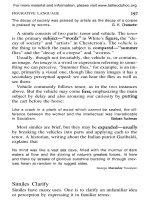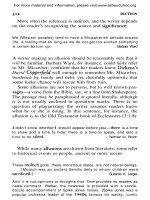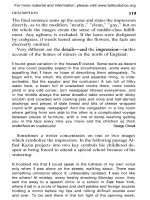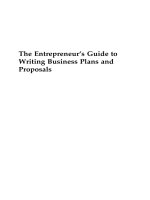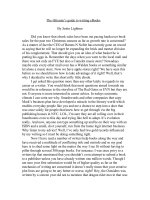the oxford essensial guide to writing phần 7 ppt
Bạn đang xem bản rút gọn của tài liệu. Xem và tải ngay bản đầy đủ của tài liệu tại đây (292.52 KB, 41 trang )
27O
DICTION
Awkward shifts are common with adjectives and adverbs.
Usually the problem is leaving off a
necessary-/^:
She dances beautiful. (For beautifully)
They did it satisfactory. (For satisfactorily)
A rough rule is that adverbs of three or more syllables end
in-ly
and that those having one or two syllables are rather
idiomatic: some always end
m-ly
(deadly), others never do
(welt), and still others may be used either way (slow or slowly,
quick or quickly).
On the fringe of barbarism are many trendy words such as
finalize and adverbs ending in-wise such as weatherwise,
university
wise, economywise. There seems little
justification
for a word like finalize, which says nothing that complete or
finish does not say. On the other hand, one can argue that
weatherwise is at least more concise than the phrase in regard
to the weather. One's tolerance for such terms depends on
how liberal or conservative one is with regard to language (or
languagewise).
Idiom
An idiom is a combination of words functioning as a unit of
meaning, as in "to take the subway [bus, streetcar] home."
Often one or more of the words has a special sense different
from its usual meaning and confined to that idiom. Thus to
take here means "to get on and travel in." In its idiomatic
sense such a word cannot be replaced by any of its usual
equivalents: we cannot
"carry,
bring, or fetch the subway
home."
Idioms are always a difficulty in learning foreign languages.
They are not easily reduced to rules and each must be
mem-
orized. Even native speakers make mistakes with idioms. The
most frequent errors involve verb-preposition combinations:
CLARITY AND SIMPLICITY
271
I
complained with my parents about their attitude.
IDIOMATIC: complained to
She concluded in saying
IDIOMATIC: concluded by
That is where we fool ourselves of our efficiency.
IDIOMATIC: fool ourselves about
They can't decide what to do with their problem.
IDIOMATIC: do about their problem
Errors like these probably come from confusing two idioms
{complain about and argue with, for example), or from se-
lecting an inappropriate one of several possible verb-
preposition idioms (we do with physical
objects—"What
shall we do with this
vase?"—but
we do about problems,
difficulties, abstractions of various
kinds—"What
shall we do
about that crack in the vase?").
Although they are most likely with verbs and prepositions,
mistakes in idiom occur with other grammatical patterns.
Some verbs, for instance, do not combine idiomatically with
certain objects:
People only look out for prestige. (Prestige is looked for, valued,
esteemed.)
Robert Frost gives the image of a silken tent in a field. (Poets create
or develop images.)
Adjectives and nouns also enter into idiomatic combina-
tions:
We have a great standard of living.
IDIOMATIC: high
The English prefer dining-room comedy.
IDIOMATIC: drawing-room comedy
zyi
DICTION
Colloquial and Pretentious Diction
Colloquialisms are expressions appropriate to informal, con-
versational occasions. In writing they may sound out of
place:
We have a swell professor of mathematics.
BETTER: nice, interesting, pleasant
Colloquial words are a problem when they fit awkwardly
with their contexts or when they are vague. And frequently
colloquialisms are vague. (What, for example, does swell mean
in the sentence above?) In speech we compensate for verbal
vagueness by gestures, tone of voice, the common ground of
knowledge and experience we share with our friends. None
of these aids to communication is available to the writer.
On the other hand, some colloquialisms are remarkably
expressive, and these are more acceptable now than they were
a generation ago, when writers were more scrupulous about
levels of usage. Today, we feel freer to mix formal words and
colloquial ones. The result, if controlled by word sense and
taste, is a clear gain in precision and variety (italics added in
both cases):
Joan's voices and visions have played tricks with her reputation.
George Bernard Shaw
There's another wrinkle to this. Elizabeth
janeway
An extreme form of colloquialism is slang. We all use slang,
and we all recognize it. But we find it very difficult to define.
Sometimes slang is an ordinary word given a special meaning:
heavy in the sense of serious, or cool in the sense of unper-
turbed or a little better than all right. Other slang terms occur
only as
slang—nerd,
for instance.
Slang tends to be short-lived: that of one generation sounds
silly to the next. (There are exceptions; some slang terms are
CLARITY AND SIMPLICITY
2J}
notably
long-lived—dough,
okay.) Slang tends also to be
richly suggestive in meaning, conveying a wide range of at-
titudes and responses and values in a brief expression (square,
hep). But the richness is likely to hide an imprecision: often
we feel that a slang term says exactly what we want to say,
but we find it very difficult to explain what that something
is.
Even more than colloquialisms, slang has an air of infor-
mality. That tone can be useful, helping to create a good
writer-reader relationship or a likable persona. Used intelli-
gently, an occasional bit of slang will not only say exactly the
right thing but also please us by its novelty (italics added):
The authors had a reputation for being jealous of each other's fame
and losing no opportunity of putting the boot in [kicking a fallen
Opponent]
Frank
Muir
I
don't mean to suggest that Segal is as gaga as this book [Love
Story]—only
that a part of him is. Pauline
Kael
Pretentiousness
Pretentiousness is using big words to no purpose (except per-
haps to show off). It results in long-winded, wooden sen-
tences filled with deadwood. Shorter, simpler words mean
shorter, clearer sentences:
Upon receiving an answer in the affirmative, he proceeded to the
bulletin board.
BETTER: Told yes, he went to the bulletin board.
Television shows which demonstrate participation in physical ex-
ercise will improve your muscle tone.
BETTER: Television exercise shows improve your muscle tone.
Remember, though, that not all unusual or learned terms
are a flaw, even when they could be replaced by simpler ones.
Skillful writers employ uncommon words to draw attention
274
DICTION
or to imply a subtlety. Here, for instance, a learned word
wittily conceals a vulgar insult:
Among those who distrust the [literary] critic as an intrusive mid-
dleman, edging his vast steatopygous bulk between author and au-
dience, it is not uncommon to wish him away, out of the direct line
of Vision. Carlos Baker
Cliches and Jargon
A cliche is a trite expression, one devalued by overuse:
an agonizing reappraisal the bottom line
at this point in time the finer things of life
cool, calm, and collected the moment of truth
history tells us the voice of the people
Many cliches are simply stale
figures
of speech:
cool as a cucumber Mother Nature
dead as a doornail pleased as Punch
gentle as a lamb sober as a judge
happy as a lark the patience of Job
in the pink the pinnacle of success
light as a feather white as snow
Cliches are dull and unoriginal. Worse, they impede clear
perception, feeling, or thought. Cliches are verbal molds into
which we force experience. Instead of shaping reality for our-
selves, we accept it, and pass it on, precast (and probably
miscast).
Cliches, however, ought not to be confused with dead
metaphors. Expressions like the key to the
problem,
the heart
of the matter, the mouth of the
river,
if they ever were cliches,
are so no longer. They are simply old metaphors long dead
and now useful, everyday diction. A cliche attempts to be
original and perceptive but fails. A dead metaphor, on the
CLARITY AND SIMPLICITY
275
other hand, makes no pretense to newness; it has dried and
hardened into a useful expression for a common idea.
A special kind of cliche is the euphemism, which softens or
conceals a fact considered improper or unpleasant. Euphe-
misms for death include to pass away, to depart this life, to go
to that big
Iwhatever]
in the
sky—all
equally trite. Poverty,
sexual matters, and diseases are often named euphemistically.
Politicians, diplomats, advertisers are adept with euphemisms:
dedication to public service = "personal ambition," a frank
exchange of views = "continued disagreement," tired blood
= "anemia."
Jargon
Jargon is technical language misused. Technical language, the
precise diction demanded by any specialized trade or profes-
sion, is necessary when experts communicate with one an-
other. It becomes jargon when it is applied outside the limits
of technical discourse. Jargon is really a kind of pretentious-
ness, a learned and mysterious language designed to impress
the nonexpert:
Given a stockpile of innovative in-house creativity for the genera-
tion of novel words, substituting members for the input of letters
whenever feasible, and fiscally optimized by computer capaciti-
zation for targeting in on core issues relating to aims, goals, and
priorities, and learned skills, we might at last be freed from our
dependence on the past.
This is in fact a parody by Lewis Thomas, a biologist who
does not write jargon. It catches the faults of jargon perfectly:
the abstract, polysyllabic Latinism (capacitization, opti-
mized); the trendy word (creativity, in-house, input, core is-
sues); the pointless redundancy (aims, goals, and priorities);
and the awesome combination of
modifiers
and headwords
(innovative in-house creativity, computer capacitization).
At its worst jargon is incomprehensible. (The word
276
DICTION
originally meant the twittering of birds.) Even when it can be
puzzled out, jargon is nothing more than puffed-up language,
a kind of false profundity in which simple ideas are padded
out in polysyllabic dress.
Awkward Figures
Figures of speech are words used less for their literal meaning
than for their capacity to clarify or intensify feelings or ideas.
For the writer of exposition the most common and important
figures are the simile and metaphor.
A simile is a comparison, generally introduced by like or
as. The essayist Robert Lynd describes the bleak houses of a
nineteenth-century city as looking "like seminaries for the
production of killjoys." A metaphor is more complicated. For
now let us say only that it expresses an implicit comparison,
not a literal one (as a simile does):
When
I
walked to the mailbox, a song sparrow placed his incom-
parable seal on the outgoing letters. E. B. white
White does not literally say that the bird's song is like a bright
stamp or seal, but the comparison is there.
In Chapter 27 we look at figures at greater length and in a
more positive light (see page 213 ff.). Here we are concerned
with their misuse. A metaphor or simile can be faulty in any
of three ways: it can be inappropriate, mixed, or
overwhelming.
Mixed metaphors ask us to perceive simultaneously two
things that simply cannot go together:
He put his foot in his mouth and jumped off the deep end.
We must feel with the fingertips of our eyeballs.
Inappropriate figures contain implications that do not fit
the context and are likely to imply meanings the writer does
not intend:
CLARITY AND SIMPLICITY
277
A green lawn spread invitingly from the road to the house, with a
driveway winding up to the entrance like a snake in the grass.
Since the writer intended no sinister implications, comparing
the driveway to a snake is misleading. Moreover, the simile,
aside from being misleading and trite, is ridiculous. A snake
in the grass is a kinetic
image—one
involving
motion—and
a
wriggling driveway is silly.
Overwhelming figures ride roughshod over the main idea,
as in the following sentence (about the considerable girth of
the comedian Jackie Gleason):
Out of that flesh grew benign tumors of driving energy and unsa-
tisfied appetite that stuck to his psyche and swelled into a galloping
disease that at once blights and regenerates him.
False Hyperbole
Hyperbole (often shortened to hype in modern usage) is de-
liberate exaggeration intended to intensify importance or
emotional force. Though no hyperbole is ever intended to
be taken literally, we may properly call it false only when
the exaggeration far outdistances the real value of the idea or
feeling:
Football is the most magnificent sport ever developed by the mind
of man. It tests physical skill, stamina, courage, and intelligence
more thoroughly than any other human activity.
One shudders to think of what the world would have been like if
Shakespeare had never written The Tempest.
Although these are silly exaggerations, hyperbole can be used
legitimately. It is an old and useful figure of speech (though
not as fashionable today as it once was). In the nineteenth
century politicians delighted in spread-eagle oratory, and his-
torians cultivated a hyperbolical style. In the following pas-
sage, for example, the American historian William H. Prescott
278
DICTION
writes about the ill effects of the gold which Spain had ex-
propriated from the New World in the 1500s:
The golden tide, which, permitted a free vent, would have fertilized
the region, through which it poured, now buried the land under a
deluge which blighted every green and living thing.
Mark Twain was a master of hyperbole, as he reveals in this
description of a tree after an ice storm:
it stands there the acme, the climax, the supremest possibility
in art or nature, of bewildering, intoxicating, intolerable magnifi-
cence. One cannot make the words strong enough.
Twain is at his
best—at
least to modern
ears—when
he uses
hyperbole for comic effect:
[On the New England weather]
In
the spring
I
have counted one
hundred and thirty-six different kinds of weather inside of four-and-
twenty hours.
[On the music of Richard Wagner] Another time we went to Mann-
heim and attended a
shivaree—otherwise
an
opera—called
"Loh-
engrin." The banging and slamming and booming and crashing
were beyond belief, the racking and pitiless pain of it remains
stored up in my memory alongside the memory of the time
I
had
my teeth fixed.
Repetitiousness
A word, unless it is important, will sound awkward if it is
repeated too closely. It ought to be replaced by a synonym
or a pronoun:
The auto industry used to produce cars that lasted, but they didn't
make enough profit so planned obsolescence came into use.
BETTER: . came into fashion.
CLARITY AND SIMPLICITY
279
This narrative is narrated by a narrator whom we cannot completely
trust.
BETTER: This story is told by a narrator whom we cannot completely
trust.
However, repetitiousness must be distinguished from le-
gitimate restatement, in which words are repeated for em-
phasis or clarity:
He [a lax governor] took things easy, and his fellow freebooters
took everything easily.
Hodding
Carter
[Oliver Goldsmith's "The Deserted Village" is] a poem written not
in ink but in tears, a rich suffusion of emotion rising up in a grubby
room in Grub street for a grubby little Irish village.
Sean O'Faolain
The line between awkward repetition and effective restate-
ment is not easy to draw. As a general rule, a repeated word
should be important, able to stand the attention readers will
give it.
Awkward Sound
We choose words primarily for what they mean, but we must
remember that words are also units of sound and rhythm.
Even people adept at silent reading will be put off by awk-
ward patterns of sound, though they may not realize exactly
what bothers them. Most often the problem is an accidental
repetition of the same sound:
There is a growing awareness of the slowing down of growth af-
fect/ng
our economy.
BETTER: There is a growing awareness that diminished rates of
growth are affecting our economy.
Built-in obsolescence has become the essence of our society.
BETTER: has become the basis of our society.
280
DICTION
At the top of the
hill
were three fine pine trees standing in a line.
BETTER: . three beautiful pine trees in a row.
But it is also true (as we saw on pages 153-54) that rhyme,
the deliberate repetition of sound, has a place in prose, as in
this example:
those Hairbreadth Harrys of History [who] save the world just
when it's slipping into the abyss. Arthur
Herzog
As is often the case with diction, it is not easy to separate
vice from virtue. Generally, rhyme is awkward when it is ac-
cidental or
when—even
if
deliberate—it
is too obvious or
heavy-handed. Effective rhyme involves key terms and does
not shout.
The best guard against awkward repetition of sound is to
read your work aloud. If words jar your ear, change them.
CHAPTER
26
Concision
Concision is brevity relative to purpose, as we saw in Chapter
20. There we looked at concision as an aspect of sentence
structure. Here we consider it from the point of view of dic-
tion. When you fail to be concise the result is deadwood,
words that perform no useful function and simply get in the
way of those that do. This chapter is about where deadwood
comes from and how it may be avoided.
Psychological Factors
Verbal profundity is the fallacy that words which look im-
pressive must mean a lot. The person, for example, who ex-
claimed of a painting that it exhibits "orderly and harmonious
juxtapositions of color patterns" seemed to be saying a great
deal. But if the words mean anything more than "color har-
mony," it is
difficult
to see what.
Closely related to verbal profundity is the desire
for
false
elegance, often a variety of what in the last chapter we called
pretentious diction. A sentence like
A worker checks the watch's time-keeping performance.
282
DICTION
is an attempt to cast a verbal spell over the job of quality
control in a watch factory. This is shorter, simpler, and
clearer:
A worker checks the watch's accuracy.
Confusion about the subject also leads to wordiness:
Music is similar to dress fads in that its styles change from time to
time. Perhaps the change is subtle, but no one style of music will
remain on top for a very long time.
I
am not talking about classical
music, but rather about popular music that appeals to the majority
of young people.
This writer did not begin with
a
word specific enough
for
his
subject. He chose too general a term ("music"). The final
sentence reveals that he himself felt the problem, for he spends
twenty words explaining what kind of music he means. How
much easier to have begun
Popular music is similar to dress fads. . . .
Sometimes deadwood stems from ignorance of words.
That's the problem here:
In this novel, part of the theme is stated directly in so many words,
and part is not so much said in specific words but is more or less
hinted at.
Had the writer known the terms explicit and implicit he could
have made the point more clearly and concisely:
In this novel, part of the theme is explicit, and part is implicit.
A limited vocabulary is no disgrace. We all suffer that hand-
icap, and education is the process of overcoming it. But while
it may be pardonable, not knowing the right word often re-
CONCISION
283
suits in obscurity
and
deadwood. It helps to keep a list of
pairs like explicit and implicit which enable you to make dis-
tinctions quickly and neatly:
extrinsic/intrinsic,
concrete/'ab-
stract,
actual/ideal,
absolute/relative
are other examples.
Finally, excessive caution contributes to deadwood. Some
people are afraid to express anything as certain. They will
,
write:
It seems that Columbus discovered the New World in 1492.
Certainly some things call for caution. But no one can lay
down a blanket rule about when qualification is necessary and
when it is verbose. We'll consider the question in closer detail
later in the chapter; for the moment remember that extreme
caution in writing is more often a vice than a virtue.
A false sense of what is significant, confusion about what
you want to say, ignorance of words, and timidity, then, are
some of the psychological factors leading to deadwood. In
practice, they are manifested in either of two ways: circum-
locution, using too many words to say something;
and
point-
lessness, saying something that doesn't need to be said at all.
Circumlocution
> Avoid
Meaningless"
Strings of Verbs
English often conveys subtleties by stringing verbs:
I
was going to go tomorrow.
Here the verbs are justified by the meaning (that a planned
future action is now uncertain or negated). But when a string
of verbs says nothing that cannot be said with equal clarity
or force in fewer words, the result is deadwood:
The current foreign situation should serve to start many Americans
to begin thinking.
BETTER: should start many Americans thinking.
284
DICTION
Nucleonics investigates the smaller particles that go to make up the
nucleus of the atom.
BETTER: . that make up the nucleus of the atom.
A special case of empty verb strings is the awkward passive
construction. The focus of thought or tact may make the pas-
sive voice necessary. Generally, however, you should write in
the active voice. Overuse of the passive lards sentences with
empty words:
The writer's point must be clearly stated by him at the beginning
of the paragraph.
BETTER: The writer must clearly state his point at the beginning of
the paragraph.
The work must be done by her by tomorrow.
BETTER: She must do the work by tomorrow.
(In the last example, however, note that if one wished to em-
phasize "work," the passive would be justified.)
t>
The Best
Modification
Is Concise and Direct
In practice this principle often boils down to not using a
phrase if a word will do:
She conducted herself in an irrational manner.
BETTER: She conducted herself irrationally.
BETTER YET: She acted irrationally.
He didn't take the advice given to him by his doctor.
BETTER: He didn't take his doctor's advice.
It
leaves us with the thought that.
BETTER:
It
leaves us thinking that
A common kind of adjectival wordiness is using a full rel-
ative clause to introduce a participle or adjective that could
be attached directly to the noun:
CONCISION 285
This is the same idea that was suggested last week.
BETTER: This is the same idea suggested last week.
The family who are living in that house are my friends.
BETTER: The family living in that house are my friends.
In such clauses the relative word (that, which, who) acts as
the subject and is immediately followed by a form of be which
is, in turn, followed by a participle or adjective. The relative
word
and
the verb contribute nothing except to hook the
adjective or participle to the noun. Occasionally clarity, em-
phasis, or rhythm justify the whole clause. Mostly they do
not.
The direct, economic use of participles is a resource of style
that inexperienced writers underuse. The economy also ap-
plies to adverbial clauses, which can sometimes be boiled
down to one or two operative words:
Because they lacked experience, they didn't do a good job.
BETTER: Lacking experience, they didn't do a good job.
Now and then, independent clauses or separate sentences
may be pruned and subordinated by means of participles:
These ideas are out of date, and they don't tell us anything new.
BETTER: These ideas are out of date, telling us nothing new.
Participles are also more economical than gerunds (the
nounal use of the -ing form of a verb; see
page
114):
She worried about the cooking of the dinner.
BETTER: She worried about cooking the dinner.
Note, however, that you must consider meaning in such re-
visions. "She worried about the cooking of the dinner" would
make sense if someone else were doing the cooking.
286
DICTION
t>
Specificity Means Concision
Beginning with a word too general for your idea creates a
need for wordy modification:
People who enter college for the first time find it difficult to adjust
to the teaching.
"People" is too inclusive. To specify what kind of "people,"
the writer must add seven words. English provides no single
term meaning "people who enter college for the first time"
(except matriculants, a Latinism too forbidding for this
writer's purpose). Students, however, would be more precise
than people, and freshmen, more precise still (even though
second-semester freshmen are not, strictly speaking, entering
college for the first time). With freshmen only one modifier
is needed:
College freshmen find it difficult to adjust to the teaching.
While most frequent with nouns, failure to be specific oc-
curs with verbs as well:
The sudden change motivated him into a rage.
BETTER: The sudden change enraged him.
They emerged victorious.
BETTER: They won.
The too-general verb is often a form of he, have, or seem.
When these merely link a noun or modifier to the subject,
they can often be replaced by a more exact verb:
The people were supportive of conservation.
BETTER: The people supported conservation.
Officers have to have a knowledge
of
their men.
BETTER: Officers have to know their men.
CONCISION
287.
>
Keep Prepositions and Conjunctions Brief
Piled-up
connectives grow like weeds if you do not pull them:
More than one game has been decided on the basis of a fumble.
BETTER: . decided by a fumble.
Wordy equivalents for because,
how,
and so are particularly
common:
The bill failed as a result of the fact that the Senate was
misinformed.
BETTER: because the Senate was misinformed.
She will show us the way in which to do it.
BETTER: She will show us how to do it.
He becomes self-conscious to the extent that he withdraws into
himself.
BETTER: He becomes so self-conscious that he withdraws into
himself.
Pointlessness
Pointless words serve no purpose. They do not need to be
made more concise; they need to be eliminated. There are two
broad causes of pointless diction: (1) failing to credit readers'
intelligence, and (2) failing to focus on the subject.
Failing to Credit Readers' Intelligence
Think about your readers, and avoid telling them what they
already know or can easily infer from the context.
t>
Don't Define What Is Common Knowledge
Accountants sometimes function as auditors (people from outside a
company who check the books kept by the company's own
accountants).
288 DICTION
All the italicized words in that sentence are dead. If readers
understand
"accountants,"
there is no reason to suppose that
"auditors" requires definition. Gratuitous definitions not
only make deadwood, but interfere with communication in
another, more serious
way—annoying
readers by seeming to
insult their intelligence.
Granted, it is not easy to decide when a word ought to be
defined. In the following instance the naturalist Joseph Wood
Krutch, writing for general readers, realizes that they will not
understand geological terms and neatly explains what they
need to know:
To even the most uninstructed eye a scorpion fossilized during the
Silurian or Devonian
epoch—say
something like three hundred mil-
lion years
ago—is
unmistakably a scorpion.
Ask yourself whether a definition is needed by the reader
whom you have in mind. (And remember that it is not too
much to ask people to look into a dictionary now and again.)
>
Don't Spell Out What Is Clearly Implied
Unless there is a clear chance of confusion, you do not have
to state what is entailed in a word's meaning (the deadwood
is italicized):
Her dress was blue in color.
He was very
tall
in height.
Noun-adjectival
combinations often contain deadwood
caused by overexplicitness. In many cases the adjective is
unnecessary:
There is considerable danger involved.
We question the methods employed.
The equipment needed is expensive.
The store stocks many products to be sold.
CONCISION
289
Each
play
has a special purpose when it is used.
This question has two sides to it
Most countries of the world have their own coinage.
In other cases it is the noun that is dead:
They committed an act of burglary.
The quarterback is noted for his passing ability.
It has existed for a long period
of
time.
She was an unusual kind of child.
The punt return resulted
in
a fumble situation.
The last major barrier to the westward expansion movement was
the Rocky Mountains.
Categorizing words such as kind, sort, type, class, and so
on are especially prone to dead use. Emphasis or tone will
sometimes justify "He is the kind of man
who "
Other-
wise, the more concise "He is a man who
"
is preferable.
Often in these noun-adjectival combinations, the adjectives
can be used substantively, that is, as nouns:
On quilts, silk patches replaced the homespun ones.
BETTER: On quilts, silk patches replaced homespun.
Verbs, too, hide implicit meanings, which, whether ex-
pressed as a complement or a modifier, are often better left
unsaid:
She always procrastinates things.
He tends to squint his eyes.
I
have been told by various people that smoking is sophisticated.
290
DICTION
Sometimes an idea is clearly implied by the total context
rather than by any single word. Each of these phrases is dead:
Writing poetry requires experience as well as sensibility. A prereq-
uisite to writing poetry is being able to write prose.
I
dislike television. Most programs on television are unbelievable.
A good personality will help anyone, no matter what profession he
or she chooses in life.
A special but frequent form of overexplicitness is the un-
needed connective, especially common with conjunctive ad-
verbs like however, therefore, furthermore, and so on. The
following sentence does not really need the connective:
People think that stamp collecting requires money; however, it
doesn't.
BETTER: People think that stamp collecting requires money; it
doesn't.
The negated verb establishes the contradiction, and removing
"however" even strengthens the point.
Probably it is true that inexperienced writers use too few
conjunctive adverbs rather than too many. Even so, it pays
to check
howevers
and thuses and
consequentlys.
Be sure that
you really need them, or rather, that your readers really need
them.
It can be wordy and tiresome to spell out all the connec-
tions of your ideas. The same impulse can make you heavy-
handed in explaining your
intentions—telling
the reader what
you're going to do next, or have just done, or won't do at all.
Such explanations are like scaffolding around a new building.
Scaffolding can be helpful in early drafts, enabling you to see
where you're going. But when they revise, experienced writ-
ers dismantle most of these planks and ladders. Some should
remain—enough
to help readers where they need help. Where
CONCISION
291
they do not, where they can follow your progress for them-
selves, scaffolding gets in the way, obscuring thought as sta-
ging around a new building conceals its shape.
Announcement—when
it cannot be justified by
emphasis—
is a particularly awkward kind of scaffolding. An overworked
formula is "Let me say" (variants: "Let me make clear," "Let
me explain," "Let me tell you something"). Be on guard
against pointless announcement at the beginning of a com-
position. Many readers react negatively to this sort of
opening:
The essay that follows is about baseball. Specifically, it will deal
with the business
organization
of a major league team.
BETTER: Supporting every major league baseball team is a complex
business organization.
Good writers help their readers, but they do not assume that
readers are helpless.
O
Avoid Empty Redundancy
Empty redundancy is pointless repetition. It is often found in
headwords and modifiers:
bisect in half
modern life of today
,
vital essentials
sufficiently satisfied
It is clearly evident that
He hanged himself, thereby taking his own life.
Unlike legitimate restatements for clarity or emphasis, such
redundancies are awkward and illogical, special instances of
not understanding what words mean. A phrase like "vital es-
sentials" seems to imply that there are "essentials" which are
not "vital," a contradiction. Can you "bisect" anything with-
out cutting it "in half"? Can a man hang himself without
292
DICTION
"thereby taking his own life"? (Never mind the rope's break-
ing; bang in such a context means to cause death.)
Failing to Focus on the Subject
Here deadwood comes
from
wandering away from the topic,
from pursuing irrelevancies:
> Don't Open Up Topics You Will Not Develop
Now an idea in itself may be interesting, but if it does not
support your topic it is just deadwood:
The people had come to the new world for freedom of several
different kinds, and had found injustice instead.
There is nothing inherently dead in "of several different
kinds." But the writer does not discuss these kinds of freedom
(nor does his subject require him to). To mention them at all,
then, is a mistake. The phrase contributes nothing to the main
point. Even worse, it mutes the contrast between the key
terms "freedom" and "injustice" and misleads readers by
pointing to a path of development they will not find.
t>
Avoid the Distinction Without a Difference
A pointless distinction is naming several varieties of some-
thing when those varieties do not matter for your purpose:
Under the honor system, teachers do not have to stand guard during
exams, tests, and quizzes.
There are of course real differences among exams, tests, and
quizzes, and had the writer been concerned with the various
modes of testing students must endure, the distinctions would
have been vital. But in fact the topic is the honor system, and
the distinction is empty. One word would do, probably
"tests," the most general.
CONCISION Z93
t>
Don't
Overqualify
It is worth saying again that excessive caution leads to dead-
wood:
Theater-in-the-round somewhat resembles an arena.
Why so cautious? Resembles does not mean "identical with";
it doesn't need the protection of "somewhat." Writing so tim-
idly is like holding up one's trousers with belt, suspenders,
and several huge safety pins. As we discussed on pages 106-
8, qualification is often necessary if you are to treat ideas
without ignoring their complexity. But pointless qualification
is wordy foolishness.
The verbs seem and tend and the windy phrase can be said
to be (in place of a simple is) often indicate overqualification:
After a square dance the people are pretty tired, but it seems that
when they have tried it once they want more.
j BETTER: but when they have tried it once they want more.
i This play tends to be a comedy.
BETTER: This play is a comedy.
Ethan can be said to be a tragic hero.
BETTER: Ethan is a tragic hero.
Another verb that is often deadwood is would. This aux-
iliary does have legitimate
uses—to
indicate a conditional ac-
tion, for example:
I
would have gone if
I
had known you were there.
Or to anticipate a future effect:
The defeat would ultimately prove disastrous.
294
DICTION
But when there is no question of doubt or conditionality or
an anticipated future, would is a wasted word (and sometimes
subtly misleading):
That would be my brother at the door.
BETTER: That is my brother at the door.


